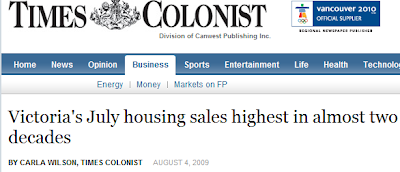In the interview, Pierre doesn't really tell us anything too specific, and CMT seems to let him off a tad bit too easy IMO. Here's an example of what I mean:
CMT asks "What percentage of mortgagors put down only 5%, and how has this percentage changed in the past two years?"CAAMP isn't CMHC. They're the Canadian Association of Accredited Mortgage Professionals. They sell CMHC backed products, but they aren't the CMHC. So Pierre doesn't answer the question but goes on to say the following:
Pierre responds: "While the recent CAAMP survey did not ask that question..."
"Their statistics show that only 9% of them have equity positions of less than 10%."Here's my question, which is really CMT's question: What do CMHC's statistics show? Pierre never answers this question and what he does offer is just a bunch of spin.
"we have found that 73% of first-time purchasers used their own resources for a down payment"So 27% don't. Is Pierre indirectly telling us that 27% of home buyers get their down payments as gifts or cash-backs? Sure looks like it. Is that statistic high? Seems like it to me. And it has absolutely nothing to do with equity position.
"75% of purchasers have a goal to be mortgage free sooner than their original amortization and 20% of recent purchasers report having made a lump sum payment to their mortgage. These results indicate that Canadians are astute mortgage consumers and manage their mortgages prudently"I have a goal to win the lottery every Wednesday and Saturday. Whoop dee do. What Pierre is really telling us is only 26% of people with the "goal to be mortgage free sooner" are actually doing anything about it right now. That's not a good number and shouldn't be misconstrued as "astute mortgage consumers who manage their mortgages prudently." What this really indicates is 74% of mortgage consumers can't or won't pay down their mortgages faster at a time when interest rates allow them to. When interest rates jump by 1% or more, even if they want to, many mortgage payers won't be able to pay down faster. And again, the answer has nothing to do with true equity position.
The real trend is down on home equity in Canada, and remarkably so, over a period of maniacal home value appreciation, which probably explains why Pierre doesn't want to answer the question.
 Let's look at another issue Pierre responds to. CMT asks: "What third parties oversee and regulate CMHC to ensure CMHC is insuring strong mortgages and not taking undue risk?"
Let's look at another issue Pierre responds to. CMT asks: "What third parties oversee and regulate CMHC to ensure CMHC is insuring strong mortgages and not taking undue risk?"Here's Pierre's response (excerpted):
"CMHC maintains capital reserves and premium reserves for future losses in accordance with guidelines set out by the Office of the Superintendent of Financial Institutions (OSFI), Canada’s mortgage insurance regulator. In fact, CMHC maintains capital reserves that are twice the minimum required by OSFI."Coincidentally, CMHC is not actually regulated by the OSFI. They really only answer to cabinet and the Auditor General of Canada. So what does this really mean? Here we should be looking for ratios. How much asset reserve does CMHC hold to backstop it's growing portfolio of mortgage insurance liabilities? Here's their annual report. I've been reading it most of the night but haven't been able to make enough sense of it to quantify their capital reserve ratio. The best I've come up with is 1:33.5, but if that's accurate, and I'm certain it isn't, it actually exceeds the bank reserve ratio maximum of around 1:18. Perhaps one of you more financially literate readers will be able to nail the true number down in the comments?
The bottom line is this: CMHC only insures mortgages that banks wouldn't write if mortgage insurance didn't exist. By their very nature, CMHC only insures sub-prime mortgages despite the fact that they claim to have "stringent requirements at all levels of down payments to ensure borrowers are able to manage their debts prudently." What's more, CMHC has bought back almost all of the loans they've underwritten over the past 18 months allowing banks to double up on the number of sub-prime mortgages they've written and effectively doubled down on the insurance risk to CMHC. Take a look at this graphic and notice the changes from 2006 to 2008 and then the drastic jump to 2009:
 They claim to be well capitalized, but what I want to see clarified is how. 2008 and 2009 were not good years for capital markets worldwide, so we know they didn't make good returns on their investments. 2008 saw roughly 75% of 2007 and 2009 sales volumes of homes, so we know they weren't collecting higher than usual premiums. Where did the capital come from that's necessary to back stop 180% compounded growth in exposure over 4 years? How does an insurance business maintain such growth (2006-2007 was 17%; 2007-2008 was 28%; and 2008-2009 is projected to be 41%)?
They claim to be well capitalized, but what I want to see clarified is how. 2008 and 2009 were not good years for capital markets worldwide, so we know they didn't make good returns on their investments. 2008 saw roughly 75% of 2007 and 2009 sales volumes of homes, so we know they weren't collecting higher than usual premiums. Where did the capital come from that's necessary to back stop 180% compounded growth in exposure over 4 years? How does an insurance business maintain such growth (2006-2007 was 17%; 2007-2008 was 28%; and 2008-2009 is projected to be 41%)?Perhaps the only move forward post-housing market meltdown will be to subject borrowers to the same strident restrictions as insurers are: that is, stress test lending. If a borrower wants $400K at 4% interest, they shouldn't get it unless they can handle the payments on $400K at 7% interest.














